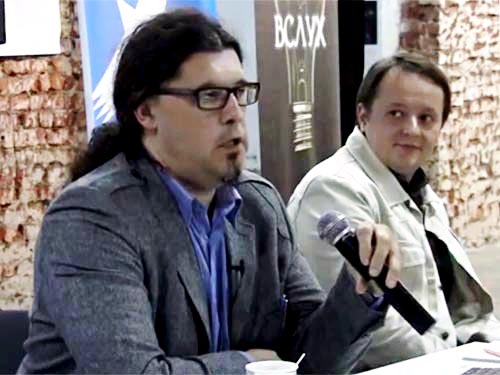The Belarusan National Platform of the EaP CSF issued a statement in connection with the wave of searches in the editorial offices of the Belarusan media and the detention of journalists.
Dr Gintautas Mažeikis: Imposture is a specific Russian mental feature (Video)

PhD from Lithuania considers impostors not to be tricksters but to be a phenomenon. In modern Russia it is again popular to be “messiahs”.
Adventurism, changeability, creativity, and imposture make up a trickster. They never represent absolute good or absolute evil, they cannot be trusted, as they can always betray; to follow them is risky as you can always be deceived. The one who is too trusting can be punished. Asserting norms and truths, a trickster is the first to overthrow and change them. But his deception is not an opposite of truth; it is a game, a carnival where good and evil, lofty and mean change places. And there is a field for creativity and creation of new values and meanings in this game. Trickster always leaves diversity after himself, he doesn’t let any truths, values, and authorities get full power of people.
Archetype of trickster is typical of all mythological system. Why did humanity create this image? What social functions does it have and how it can be useful for comprehension of modern reality? Philosopher and professor of Vytautas Magnus University (Kaunas) Dr Gintautas Mažeikis on September 26 in Urbi et Orbi lectures’ cycle presented a lecture on “Facets of modern trickstery and rehabilitation of progressive lies”.
In his lecture, Dr Mažeikis noted the phenomenon of trickstery as a typical feature of Russian society in its certain historical periods, or “troubled times”, when skomorokhs were crowded. When Pseudo-Demetrius came skomorokhs were already illegal in Muscovy. “But after Pseudo-Demetrius was killed, the legend says that he was dressed as a skomorokhs. And this image of a crowded skomorokhs makes us think what is imposture for Russia? And why there were so many impostors in this country? If in other countries it happened by accident, in Russia it was almost a disease. Imposture is a specific Russian internal mental feature,” believes Dr Gintautas Mažeikis.
According to him, the role of impostors in Russia is very existential. “It is dangerous to be a impostor in Russia; there is no other way but to ascend the throne only to be sent to gallows afterwards. There is no other option for a Russian impostor; he has chosen his fate, and immediately becomes sacred like a Messiah,” notes Dr Mažeikis.
Dr Mažeikis also places a notorious Igor Strelkov-Girkin, the main character in Donbas events, who suddenly turned to Moscow, among impostors. Dr Mažeikis believes such return to be very demonstrative.
“Nobody knows exactly whether he is Girkin or Strelkov; everything is unclear about him. According to one social poll, he came to be more famous than Putin. I am interested in him as a persona. As far as I know, he is archeologist by profession, got interested in historical reconstructions, with World War I and civil wars as his favourite subjects. Everyone thought it to be a game, but as all impostors he suddenly believed that he is a real White Guard, who for some reason carries out decrees of the World War II and USSR Supreme Council. He announces Novorussia and announces himself to be Defense Minister. He speaks about no oligarchs and no criminals, and how this land is going to be revived and sacred,” remarks Dr Mažeikis.
A trickster is always frank. “He plays his role with all his heart. And any impostor, any Messiah is frank. But the thing is that in the end tricksters always violate the rules once created by them. And steps over their projects. They leave, just as Strelkov left for Moscow. A trickster doesn’t aim at getting power once and for all; after getting this power he loses it. It might disclose the secret of why impostors never stay in power in Russia. They might become tsars, but they are to lose their throne in the end. However, an impostor is not a trickster, he is a part of trickstery. And the end of an impostor is not the one to laugh at,” assumes Dr Gintautas Mažeikis.
EuroBelarus Information Service
Video:
Others
-
Statement of the Belarusan EaP CSF National Platform on solidarity with the civil society of Armenia
The Belarusan National Platform of the Eastern Partnership Civil Society Forum issued a statement on solidarity with the civil society of Armenia.
-
Statement of the BNP in connection with the criminal prosecution of the leaders of the Belarusan independent trade unions
The Belarusan National Platform of the Eastern Partnership Civil Society Forum issued a statement in connection with the criminal prosecution of the leaders of the Belarusan independent trade unions.
-
Final event of project CHOICE — Paving the way to European Year of Cultural Heritage 2018
The final event of the two-year EU funded project CHOICE — Cultural Heritage: Opportunity for Improving Civic Engagement was held on June 6, 2017 at the Committee of the Regions, in Brussels.
-
Heritage is a verb. The results of the CHOICE project were summarized in Minsk (Photos and video)
Does Belarus need a “Public Ministry of Culture” and “Ašmiany Charter” to deal with the historical and cultural sites?








Comments
From farewell to a new Eastern policy and towards a new development
Poland and Germany were both initiators and drivers of a New Eastern policy linked to the Eastern neighborhood and Russia/Soviet Union.